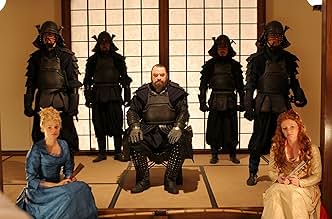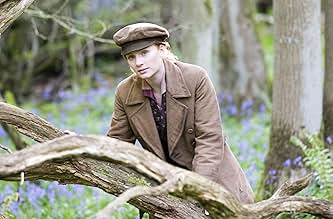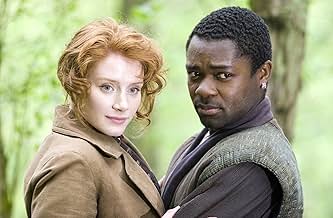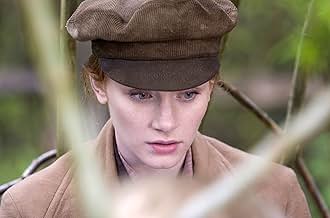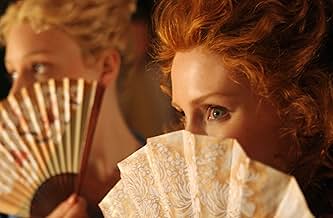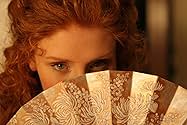PUNTUACIÓN EN IMDb
6,0/10
4 mil
TU PUNTUACIÓN
La hija del poderoso Duque debe demostrar su valentía e inventiva para estar con el hombre que ama.La hija del poderoso Duque debe demostrar su valentía e inventiva para estar con el hombre que ama.La hija del poderoso Duque debe demostrar su valentía e inventiva para estar con el hombre que ama.
- Dirección
- Guión
- Reparto principal
- Premios
- 1 premio y 6 nominaciones en total
Nobuyuki Takano
- Charles
- (as Nobuyuki "Daishi" Takano)
Reseñas destacadas
Kenneth Branagh seems to get a fair bit of stick in some places, and I'm never quite sure why. Whether it's because he picks unfashionable projects to direct or star in, or because he comes across as a theatrical English "luvvy", I don't know. But for me, his lonely (almost solitary) championing of modern big screen Shakespeare adaptations has always been cause for celebration. Time and again he has sought to make the bard's literature not only appealing and comprehensible to the audience of today, but also relevant - to show that Shakespeare has always got something to say about society and people. If nothing else, English teachers worldwide must be relieved there are alternatives to showing kids the more archaic Olivier golden oldies.
His latest adaptation, As You Like It, is no exception. For those unfamiliar with the play, it's basically a romantic comedy, with a bit of political drama thrown in for good measure. Here the action is relocated from Middle Ages France to 19th century Japan (stay with me), when the country was being opened up to the West. A small group of Western settlers have more or less set up their own private kingdom here. You can find a detailed plot synopsis elsewhere on the web I'm certain, but I'll try and summarise it anyway: Rosalind (Bryce Dallas Howard) is the daughter of Duke Senior (Brian Blessed, with long white hair), who is usurped by his own treacherous brother, Duke Frederick (Blessed again, with dark hair this time, doing the usurping in a neat wordless sequence). Senior is exiled to the forest with his followers, while Rosalind is forced to remain and keep Frederick's daughter Celia (Romola Garai) company. Frederick becomes paranoid though, and banishes Rosalind as well shortly afterwards. Celia, best friends with Rosalind, decides to accompany her; naturally, both are forced to disguise themselves, which causes complications when the one Rosalind loves, Orlando (David Oyelowo), declares his undying love for her.
Bright, breezy and instantly accessible, Branagh has come up trumps. Staying behind the camera this time out, the cast is led by Bryce Dallas Howard, in a performance that will surely (if there is any justice in the world) attract awards attention. The part of Rosalind is one of the most popular and sought after female roles in all of Shakespeare. She is sweet and kind, but not simpering - she's quite decisive too. She is the dynamic behind the play's actions, and Howard seizes the role with everything she's got. The supporting cast are uniformly excellent too - the legend that is Brian Blessed is always great value, and he does well here in his dual role, particularly the evil Frederick. David Oyelowo is also excellent, while Alfred Molina is very funny in the comic relief role of Touchstone, the court fool. Look out too for Patrick Doyle, the film composer who provides the score here but also performs on screen in the singing role of Amiens.
Obviously the unique spin on this adaptation is the setting. The play is mostly set in the forest of Arden, so nature is a prominent theme throughout. Branagh highlights this by moving the action to pre-20th century Japan, where beauty and peace can be readily found in nature. The film is gorgeous to look at, not only in the forest settings, but also in the 'court' during the first act's coup d'etat - the sets and costumes look brilliant.
I won't try and argue that this is going to be the best film of 2007, because I'm sure that would be nonsense. The film has faults, although some of these might be attributed to the source material (with which I'm not familiar) - one or two characters seem to disappear halfway through, while Duke Frederick's fate is a cop-out even by Shakespeare's standards. But the important thing is that Branagh has made the play very easy to follow, very humorous and also given it a contemporary edge, as well as making an entertaining film in its own right. And for that, he surely deserves a cheer at least.
I urge anyone to seek the film out, whether you're interested in Shakespeare or not, because it is simply great fun. Here's hoping Mr Branagh continues to get his films funded and made.
His latest adaptation, As You Like It, is no exception. For those unfamiliar with the play, it's basically a romantic comedy, with a bit of political drama thrown in for good measure. Here the action is relocated from Middle Ages France to 19th century Japan (stay with me), when the country was being opened up to the West. A small group of Western settlers have more or less set up their own private kingdom here. You can find a detailed plot synopsis elsewhere on the web I'm certain, but I'll try and summarise it anyway: Rosalind (Bryce Dallas Howard) is the daughter of Duke Senior (Brian Blessed, with long white hair), who is usurped by his own treacherous brother, Duke Frederick (Blessed again, with dark hair this time, doing the usurping in a neat wordless sequence). Senior is exiled to the forest with his followers, while Rosalind is forced to remain and keep Frederick's daughter Celia (Romola Garai) company. Frederick becomes paranoid though, and banishes Rosalind as well shortly afterwards. Celia, best friends with Rosalind, decides to accompany her; naturally, both are forced to disguise themselves, which causes complications when the one Rosalind loves, Orlando (David Oyelowo), declares his undying love for her.
Bright, breezy and instantly accessible, Branagh has come up trumps. Staying behind the camera this time out, the cast is led by Bryce Dallas Howard, in a performance that will surely (if there is any justice in the world) attract awards attention. The part of Rosalind is one of the most popular and sought after female roles in all of Shakespeare. She is sweet and kind, but not simpering - she's quite decisive too. She is the dynamic behind the play's actions, and Howard seizes the role with everything she's got. The supporting cast are uniformly excellent too - the legend that is Brian Blessed is always great value, and he does well here in his dual role, particularly the evil Frederick. David Oyelowo is also excellent, while Alfred Molina is very funny in the comic relief role of Touchstone, the court fool. Look out too for Patrick Doyle, the film composer who provides the score here but also performs on screen in the singing role of Amiens.
Obviously the unique spin on this adaptation is the setting. The play is mostly set in the forest of Arden, so nature is a prominent theme throughout. Branagh highlights this by moving the action to pre-20th century Japan, where beauty and peace can be readily found in nature. The film is gorgeous to look at, not only in the forest settings, but also in the 'court' during the first act's coup d'etat - the sets and costumes look brilliant.
I won't try and argue that this is going to be the best film of 2007, because I'm sure that would be nonsense. The film has faults, although some of these might be attributed to the source material (with which I'm not familiar) - one or two characters seem to disappear halfway through, while Duke Frederick's fate is a cop-out even by Shakespeare's standards. But the important thing is that Branagh has made the play very easy to follow, very humorous and also given it a contemporary edge, as well as making an entertaining film in its own right. And for that, he surely deserves a cheer at least.
I urge anyone to seek the film out, whether you're interested in Shakespeare or not, because it is simply great fun. Here's hoping Mr Branagh continues to get his films funded and made.
Seeing As You Like It, William Shakespeare's romantic comedy of mistaken identity brought back memories of an amateur production of the Carousel Theater here in Vancouver many years ago in which my son David played a small role. It was a wonderful presentation that thoroughly captured the genius of Shakespeare's delightful imagination. Unfortunately, the new filmed version by Kenneth Branagh with its big budget and professional cast is not in the least bit as convincing or entertaining. It is miscast, over produced, over acted, and simplistic with its multi-layered plot made easier to follow than Sesame Street.
Set in Japan in the 19th Century after the country was opened to the West as a trading partner, the royalty of England have been reinvented as wealthy merchants living on the Japanese seacoast. Neither the opulent backgrounds nor the conceit of the script, however, has any impact on either understanding or enjoyment of the play and the setting seems to be simply a marketing decision not an artistic one. The film opens with a kabuki scene at the court of Duke Senior (Brian Blessed). His brother Frederick, also played by Blessed with black hair, interrupts the proceedings to forcibly overthrow his brother's dukedom and the elder Duke is banished to the Arden Forest. Orlando, played by the Nigerian born David Oyelowo, and his brother Oliver (Adrian Lester) then proceed to fight over their position in the court.
Oliver, aligned with Frederick, entices his brother to take on a 300-pound sumo wrestler to all but certain doom but, as the script will have it, the underdog prevails in spite of a weight differential of about 150 pounds. In addition to being victorious at sport, he also falls for one of his well-wishers, the attractive Rosalind (Bryce Dallas Howard), daughter of Duke Senior. Fearful of her safety at the court, Rosalind, pretending to be a man and, taking the name of Ganymede from the handsome cup bearer to the Gods in Greek mythology, sneaks out with her cousin Celia (Romola Garai) and the clown Touchstone (Alfred Molina) to seek out her father in the Forest of Arden. Soon they are joined by Orlando who also fears for his life after a fight with his brother Oliver over their inheritance.
Before long, a bunch of other personages wander into the film including a melancholy philosopher named Jaques (Kevin Kline) who is described as "an exiled courtier", a young shepherd Silvius (Alex Wyndham) who pursues his reluctant girlfriend Phebe (Jade Jefferies), and others. Curiously, there are two characters named Jaques and two named Oliver, something that most writers would go to any length to avoid. The play is best noted for the cynical soliloquy chronicling the seven ages of man, "All the world's a stage and all the men and women merely players: They have their exits and their entrances, and one man in his time plays many parts", delivered with properly dour expression by Kline.
It would not be a Shakespearean comedy without some gender confusion and Rosalind, after noticing Orlando's love poems neatly positioned on trees all over their neck of the woods, knows that Orlando loves her. Approaching Orlando in her boy disguise as Ganymede, Rosalind endeavors to teach him the finer points of courtship if he would just pretend that he is a she. She uses her charm to seduce Orlando, but also is drawn reluctantly into a relationship with the shepherdess Phebe. In Elizabethan conventions, this meant that a boy playing the girl Rosalind would dress as a boy and then be wooed by another boy playing Phebe.
Quite naturally, this being a comedy and all, everyone ends up happy, (dramatized in a finale of the utmost silliness by Branagh) except for Jaques who, in character, decides not to return to the court. All the pieces are in place for the film to be successful but there are key elements that work against it. For the play to work at all, Rosalind has to be believable as a young man. If she is not, Orlando looks like a complete fool, and the play is robbed of its intended homoerotic playfulness. In this case, Branagh does not even attempt to have Rosalind look masculine and the scenes with Orlando in which he/she is teaching him how to express his love are unconvincing (unless you read it that Orlando goes along with the ruse and the author is simply making a statement about role playing, the masks people wear (himself?) in life, and the inauthenticity of self).
Rosalind is supposed to be pure, innocent, perhaps a little naïve but definitely virtuous. Howard, however, is very un-maiden like in appearance and manner and lacks any noticeable chemistry with her lover. She tries so hard to put the correct inflections in the words that she robs them of whatever poetry they might have had, conveying the impression that she is trying out eagerly for a grammar school play. This is Branagh's fifth attempt to put Shakespeare on film and I'm sure it won't be his last. After achieving considerable artistic but not financial success with the first three, he has opted in this latest film for less of an artistic statement than an overtly commercial approach. Love's Labours Lost was an unmitigated disaster scorched by the critics and shunned by audiences. Unfortunately, As You Like It may follow in its path.
Set in Japan in the 19th Century after the country was opened to the West as a trading partner, the royalty of England have been reinvented as wealthy merchants living on the Japanese seacoast. Neither the opulent backgrounds nor the conceit of the script, however, has any impact on either understanding or enjoyment of the play and the setting seems to be simply a marketing decision not an artistic one. The film opens with a kabuki scene at the court of Duke Senior (Brian Blessed). His brother Frederick, also played by Blessed with black hair, interrupts the proceedings to forcibly overthrow his brother's dukedom and the elder Duke is banished to the Arden Forest. Orlando, played by the Nigerian born David Oyelowo, and his brother Oliver (Adrian Lester) then proceed to fight over their position in the court.
Oliver, aligned with Frederick, entices his brother to take on a 300-pound sumo wrestler to all but certain doom but, as the script will have it, the underdog prevails in spite of a weight differential of about 150 pounds. In addition to being victorious at sport, he also falls for one of his well-wishers, the attractive Rosalind (Bryce Dallas Howard), daughter of Duke Senior. Fearful of her safety at the court, Rosalind, pretending to be a man and, taking the name of Ganymede from the handsome cup bearer to the Gods in Greek mythology, sneaks out with her cousin Celia (Romola Garai) and the clown Touchstone (Alfred Molina) to seek out her father in the Forest of Arden. Soon they are joined by Orlando who also fears for his life after a fight with his brother Oliver over their inheritance.
Before long, a bunch of other personages wander into the film including a melancholy philosopher named Jaques (Kevin Kline) who is described as "an exiled courtier", a young shepherd Silvius (Alex Wyndham) who pursues his reluctant girlfriend Phebe (Jade Jefferies), and others. Curiously, there are two characters named Jaques and two named Oliver, something that most writers would go to any length to avoid. The play is best noted for the cynical soliloquy chronicling the seven ages of man, "All the world's a stage and all the men and women merely players: They have their exits and their entrances, and one man in his time plays many parts", delivered with properly dour expression by Kline.
It would not be a Shakespearean comedy without some gender confusion and Rosalind, after noticing Orlando's love poems neatly positioned on trees all over their neck of the woods, knows that Orlando loves her. Approaching Orlando in her boy disguise as Ganymede, Rosalind endeavors to teach him the finer points of courtship if he would just pretend that he is a she. She uses her charm to seduce Orlando, but also is drawn reluctantly into a relationship with the shepherdess Phebe. In Elizabethan conventions, this meant that a boy playing the girl Rosalind would dress as a boy and then be wooed by another boy playing Phebe.
Quite naturally, this being a comedy and all, everyone ends up happy, (dramatized in a finale of the utmost silliness by Branagh) except for Jaques who, in character, decides not to return to the court. All the pieces are in place for the film to be successful but there are key elements that work against it. For the play to work at all, Rosalind has to be believable as a young man. If she is not, Orlando looks like a complete fool, and the play is robbed of its intended homoerotic playfulness. In this case, Branagh does not even attempt to have Rosalind look masculine and the scenes with Orlando in which he/she is teaching him how to express his love are unconvincing (unless you read it that Orlando goes along with the ruse and the author is simply making a statement about role playing, the masks people wear (himself?) in life, and the inauthenticity of self).
Rosalind is supposed to be pure, innocent, perhaps a little naïve but definitely virtuous. Howard, however, is very un-maiden like in appearance and manner and lacks any noticeable chemistry with her lover. She tries so hard to put the correct inflections in the words that she robs them of whatever poetry they might have had, conveying the impression that she is trying out eagerly for a grammar school play. This is Branagh's fifth attempt to put Shakespeare on film and I'm sure it won't be his last. After achieving considerable artistic but not financial success with the first three, he has opted in this latest film for less of an artistic statement than an overtly commercial approach. Love's Labours Lost was an unmitigated disaster scorched by the critics and shunned by audiences. Unfortunately, As You Like It may follow in its path.
On the whole, I agree with the many reviewers before me who praise Kenneth Branagh in general and "As You Like It" in specific. So, I don't have to reiterate their comments here. I am writing to rebut the review by teacher_tom516 who completely misunderstands the movie, the play and the term "suspension of disbelief." Starting with the last, Samuel Taylor Coleridge called it "the willful suspension of disbelief," the tacit agreement made by the audience to leave reality at the door of the theater and accept the production's conceit as a temporary new reality. All theater, with the exception of the mercifully brief 19th century flirtation with "Realism/Naturalism", recognizes that it is an illusion to try to present "reality" on stage. Shakespeare certainly knew that and even tells his audience this in several of his plays (Henry V, Hamlet, The Tempest, A Midsummer Night's Dream, etc etc). His comedies are allegorical -- more subtly, so are his tragedies and even histories. His audiences accepted the premise without caviling over clocks striking in "Julius Caesar" and wild animals from different continents nonchalantly coexist. Shakespeare's Forest of Arden wasn't named for the Belgian Ardennes but taken from Lodge's romance "Rosalynde," from which Shakespeare cribbed his plot and characters. It is a magical place not found on maps -- it is the "Bitter Wood" of Medieval legend, the place where humans must face themselves, with or without Yoda. Arden was also Shakespeare's mother's family name. The writer plays the name game with the characters, seemingly unaware that Shakespeare's names are often chosen for their metaphoric associations. Falstaff is a "false staff" to Prince Hal. Why Orlando? Not because it's an Italian courtier's name, but because it's the Italian translation of Roland, the name of one of two legendary brothers-in-arms in the reign of Charlemagne, immortalized in "The Song of Roland." The other brother-knight's name was... Oliver! Also, It's Jaques, not Jacques, and may have been pronounced "Jakes", Brit slang for bathroom, which might be taken as ironic since he is such a pessimist, unlike his opposite, Touchstone, whose name might be taken as the iconic test of Truth. Do the hodge-podge of names in Hamlet disturb teacher_tom516? Claudius? Polonius? Laertes? Rosencrantz and Guildenstern!?
His biggest complaint is about the Japanese setting. Obviously, he didn't read the opening on-screen explanation Mr. Branagh thoughtfully provided for the edification of anyone interested in it. Is the Meiji Japan of the imagination be any less exotic than the locale of "A Winter's Tale" -- "the coast of Bohemia."? Bohemia doesn't have a coast -- it's completely landlocked. Oh yes, how absurd a scrawny kid could throw a Sumo wrestler? That's the whole point. Ever hear of Jack the Giant-killer? Beware people who confuse the truths of fairy tales with the factoids of spreadsheets. Yes, Shakespeare plays fast and loose with facts - so do creative directors interpreting his plays. As Miguel de Cervantes said, "One should never let facts get in the way of Truth." He also said, "Facts are the enemy of Truth."
His biggest complaint is about the Japanese setting. Obviously, he didn't read the opening on-screen explanation Mr. Branagh thoughtfully provided for the edification of anyone interested in it. Is the Meiji Japan of the imagination be any less exotic than the locale of "A Winter's Tale" -- "the coast of Bohemia."? Bohemia doesn't have a coast -- it's completely landlocked. Oh yes, how absurd a scrawny kid could throw a Sumo wrestler? That's the whole point. Ever hear of Jack the Giant-killer? Beware people who confuse the truths of fairy tales with the factoids of spreadsheets. Yes, Shakespeare plays fast and loose with facts - so do creative directors interpreting his plays. As Miguel de Cervantes said, "One should never let facts get in the way of Truth." He also said, "Facts are the enemy of Truth."
How dumb do you have to be to watch a Shakespeare film and then complain, like certain reviews here, that it has Shakespeare's dialogue? What did you expect? Apart from anything else, the dialogue - the poetry of the greatest-ever writer of English - is the whole point. Without that, you have only a highly improbable story made up of contrived situations connected together only tenuously. With it - if it is well performed - a golden, magical glow of love and wit. If you don't understand it, rather than expecting it to be dumbed down to your level you should be prepared to put a bit of work in, read the play over slowly and puzzle it out - or else just admit that it is over your head. But don't blame the play for your own deficiencies.
I'm not fond, though, of the modern fashion for productions with apparently random, irrelevant concepts - in this case old-time Japan - to which Branners adds by his insistence on casting American stars who (inevitably) can't really handle the dialogue.
I'm not fond, though, of the modern fashion for productions with apparently random, irrelevant concepts - in this case old-time Japan - to which Branners adds by his insistence on casting American stars who (inevitably) can't really handle the dialogue.
I have to admit that I don't really care for most of Shakespeare's comedies, which involve huge casts, pairs of lovers, and a lot of talking at chance meetings. So it is with AS YOU LIKE IT, which I suspect for most people will only be really enjoyable as a lot of scattered scenes performed by some really good actors. That said, it's been going on 20 years (!) since Branagh first started directing these Shakespeare extravaganzas, so what point has he gotten to? First, the bad points, then the good points.
After almost 20 years, it's clear that Branagh has almost no new ideas when it comes to moving the camera around. A lot of the shots and gimmicks have been ripped straight from HENRY V and MUCH ADO ABOUT NOTHING. Sometimes they're simple and effective and the right choices; other times, the recycling is just embarrassing.
Second, Branagh continues to bite off more than he can chew by attempting novel or gimmicky stagings of these venerable old plays as films, a trend that he began with HAMLET (Four Hour Hamlet! No Lines Cut!), carried through to LOVE'S LABOURS LOST (an ambitious failure, but still a failure with a Capital F) and now here with an AS YOU LIKE IT set in Japan, a choice comprehensible only because Branagh explains it to the audience with several title cards. Which means, it's an incomprehensible choice because he has to explain it so much. This is the sort of adventurous staging that works OK on the London stage, where there are 100 Shakespeare stagings a year and this sort of transposition is expected in order to keep things fresh. But on film, it is mostly confusing (although very pretty).
Now for the good things, and they are very much worth noting as hopeful signs for the future of Branagh's grand Shakespearean experiment.
The casting in this film is almost uniformly excellent. Branagh has (mercifully) abandoned showy stunt casting in favor of assembling a diverse cast that actually can act and actually has Shakespearean experience. Kevin Kline, David Oyewelo, the lovely Bryce Dallas Howard, Adrian Lester, Alfred Molina, Romola Garai (a real surprise)... you're in good hands with all these performers, which is not something you could say of a Branagh Shakespeare film since HENRY V. Furthermore, Branagh has stopped the nonsense where anyone can just show up on these films sporting whatever accents they like, regardless of the film's time or place setting (which was tolerable in MUCH ADO, but silly in HAMLET and excruciating in LOVE'S LABOURS LOST). This film is about English characters: so everyone's got an English accent, even the Americans. Thank God. Branagh has also managed a way to cast fine actors of color without trying to make us believe that a black actor and white actor are siblings (MUCH ADO, again).
Bryce Dallas Howard -- dare I say it -- it a better actress and more luminously beautiful and commanding a screen presence than Emma Thompson was in MUCH ADO ABOUT NOTHING.
Even more surprisingly, Branagh has also given his faithful old company of secondary players from the old Renaissance Theatre Company -- you'll recognize them from his previous films -- room to actually act like the professionals they are. Brian Blessed doesn't quite pull it off in a dual role, and well, Richard Briers is ubiquitous in Branagh's films, but Richard Clifford, Jimmy Yuill, Gerard Horan and Patrick Doyle are given a little bit more to do and it's a real asset to the film. These performers assist in giving AS YOU LIKE IT -- dare I say it (dare I even hope it) -- the earthy, humanistic feel that made his HENRY V so very memorable. Which leads one to wonder: WHY did Branagh go for all this flash and glitter with Hollywood stars (starting with MUCH ADO) in the first place, eventually leading to the train wreck that was LOVE's LABOURS LOST? Why didn't he just stick with the approach that worked so brilliantly with HENRY V - still one of the greatest Shakespeare films of all time? For God's sake... BRING BACK THE RENAISSANCE THEATRE COMPANY!!!!
If Branagh has not really grown as a director, this film shows that his creative team -- cinematographer Roger Lanser, production designer Tim Harvey, and composer Patrick Doyle -- continue to do him just as good service as ever, and even seem to kick it up a notch.
The verdict? A problematic film, one that might not appeal to everyone, and decidedly less showy or fun than his popular MUCH ADO... but all in all, a definite step forward for the great Branagh Shakespeare film project. He should get another chance from HBO Films to do another one.
After almost 20 years, it's clear that Branagh has almost no new ideas when it comes to moving the camera around. A lot of the shots and gimmicks have been ripped straight from HENRY V and MUCH ADO ABOUT NOTHING. Sometimes they're simple and effective and the right choices; other times, the recycling is just embarrassing.
Second, Branagh continues to bite off more than he can chew by attempting novel or gimmicky stagings of these venerable old plays as films, a trend that he began with HAMLET (Four Hour Hamlet! No Lines Cut!), carried through to LOVE'S LABOURS LOST (an ambitious failure, but still a failure with a Capital F) and now here with an AS YOU LIKE IT set in Japan, a choice comprehensible only because Branagh explains it to the audience with several title cards. Which means, it's an incomprehensible choice because he has to explain it so much. This is the sort of adventurous staging that works OK on the London stage, where there are 100 Shakespeare stagings a year and this sort of transposition is expected in order to keep things fresh. But on film, it is mostly confusing (although very pretty).
Now for the good things, and they are very much worth noting as hopeful signs for the future of Branagh's grand Shakespearean experiment.
The casting in this film is almost uniformly excellent. Branagh has (mercifully) abandoned showy stunt casting in favor of assembling a diverse cast that actually can act and actually has Shakespearean experience. Kevin Kline, David Oyewelo, the lovely Bryce Dallas Howard, Adrian Lester, Alfred Molina, Romola Garai (a real surprise)... you're in good hands with all these performers, which is not something you could say of a Branagh Shakespeare film since HENRY V. Furthermore, Branagh has stopped the nonsense where anyone can just show up on these films sporting whatever accents they like, regardless of the film's time or place setting (which was tolerable in MUCH ADO, but silly in HAMLET and excruciating in LOVE'S LABOURS LOST). This film is about English characters: so everyone's got an English accent, even the Americans. Thank God. Branagh has also managed a way to cast fine actors of color without trying to make us believe that a black actor and white actor are siblings (MUCH ADO, again).
Bryce Dallas Howard -- dare I say it -- it a better actress and more luminously beautiful and commanding a screen presence than Emma Thompson was in MUCH ADO ABOUT NOTHING.
Even more surprisingly, Branagh has also given his faithful old company of secondary players from the old Renaissance Theatre Company -- you'll recognize them from his previous films -- room to actually act like the professionals they are. Brian Blessed doesn't quite pull it off in a dual role, and well, Richard Briers is ubiquitous in Branagh's films, but Richard Clifford, Jimmy Yuill, Gerard Horan and Patrick Doyle are given a little bit more to do and it's a real asset to the film. These performers assist in giving AS YOU LIKE IT -- dare I say it (dare I even hope it) -- the earthy, humanistic feel that made his HENRY V so very memorable. Which leads one to wonder: WHY did Branagh go for all this flash and glitter with Hollywood stars (starting with MUCH ADO) in the first place, eventually leading to the train wreck that was LOVE's LABOURS LOST? Why didn't he just stick with the approach that worked so brilliantly with HENRY V - still one of the greatest Shakespeare films of all time? For God's sake... BRING BACK THE RENAISSANCE THEATRE COMPANY!!!!
If Branagh has not really grown as a director, this film shows that his creative team -- cinematographer Roger Lanser, production designer Tim Harvey, and composer Patrick Doyle -- continue to do him just as good service as ever, and even seem to kick it up a notch.
The verdict? A problematic film, one that might not appeal to everyone, and decidedly less showy or fun than his popular MUCH ADO... but all in all, a definite step forward for the great Branagh Shakespeare film project. He should get another chance from HBO Films to do another one.
¿Sabías que...?
- CuriosidadesThis was the ninth and final film directed by Kenneth Branagh in which Richard Briers stars. The others are Enrique V (1989), Los amigos de Peter (1992), Swan Song (1992), Mucho ruido y pocas nueces (1993), Frankenstein de Mary Shelley (1994), En lo más crudo del crudo invierno (1995), Hamlet de Kenneth Branagh (1996) and Trabajos de amor perdidos (2000).
- PifiasLions are not native to Japan. The lion is a carryover from the original play, which was set in a generic European country at an indeterminate time in the Middle Ages. Even that didn't make much sense, as lions have been extirpated from the main part of Europe since the 4th century AD, and from the Caucasus since the 10th century. But many Europeans, possibly including William Shakespeare, didn't know that lions weren't around anymore.
- Citas
Touchstone: The fool doth think he is wise, but the wise man knows himself to be a fool.
- Créditos adicionalesThe picture seems to end without the play's Epilogue. Then, the closing credits begin, when they are suddenly interrupted by Bryce Dallas Howard, still in character as Rosalind, who then is seen speaking the Epilogue as she begins to walk to her trailer, drinking a cup of coffee along the way. After the speech, Kenneth Branagh can be heard off-screen saying "Aaaand...cut!" After this, the closing credits resume.
- Versiones alternativasThe version shown on cable television has been formatted to the aspect ratio commonly used in HDTV production (that is, anywhere from 1.78:1 to 1.85:1), while the version released to movie theatres was released in the typical CinemaScope/Panavision aspect ratio (2.39:1). It is the theatrical version which has been issued on DVD. Since the film was made using the Super 35 format, it was possible to make versions of the film in different aspect ratios.
- ConexionesFeatured in 14th Annual Screen Actors Guild Awards (2008)
- Banda sonoraUnder the Greenwood Tree
Composed by Patrick Doyle
Lyrics by William Shakespeare
Performed by Patrick Doyle and London Symphony Orchestra
Selecciones populares
Inicia sesión para calificar y añadir a tu lista para recibir recomendaciones personalizadas
- How long is As You Like It?Con tecnología de Alexa
Detalles
- Fecha de lanzamiento
- Países de origen
- Idioma
- Títulos en diferentes países
- As You Like It
- Localizaciones del rodaje
- Empresas productoras
- Ver más compañías en los créditos en IMDbPro
Taquilla
- Recaudación en todo el mundo
- 563.162 US$
- Duración2 horas 7 minutos
- Color
- Mezcla de sonido
Contribuir a esta página
Sugerir un cambio o añadir el contenido que falta

Principal laguna de datos
By what name was Como gustéis (2006) officially released in India in English?
Responde



